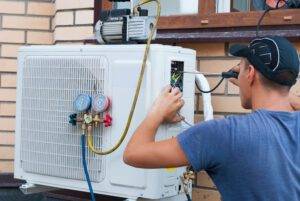
The government is facing censure from the National Audit Office (NAO) over insufficient progress in encouraging households to transition to clean heating, with uptake of heat pumps falling significantly short of expectations.
According to a report by the NAO, assumptions regarding consumer demand for heat pumps have proven to be overly optimistic. Despite government efforts to promote awareness and offer grants to facilitate the replacement of oil and gas-fired boilers with heat pumps, public engagement in the transition remains lacking.
The report highlighted that only 18,900 heat pumps were installed under the grant scheme between May 2022 and December 2023, representing less than half of the anticipated installations. While there has been a modest increase in installations following an increase in grant funding, doubts persist regarding the sustainability of this upward trend.
Two primary barriers to increased installations were identified: poor awareness among consumers and the high upfront cost of heat pumps, despite grant assistance. Heat pumps are considerably more expensive than traditional gas boilers, despite their greater efficiency.
The government has set ambitious targets for the installation of 600,000 heat pumps annually by 2028. However, divisions within the Department for Energy Security and Net Zero (DESNZ) regarding the strategies to achieve this goal have emerged.
A mechanism aimed at penalising boiler manufacturers failing to meet electric heat pump sales targets has led to conflict, with companies raising prices to offset potential fines. Energy Secretary Claire Coutinho has initiated an investigation by the Competition and Markets Authority (CMA) into the home heating market in response to these developments.
The NAO recommended that the government make a decision on the role of hydrogen in reducing emissions before the planned deadline of 2026.
Gareth Davies, head of the NAO, emphasized the necessity for comprehensive engagement with households to achieve the government’s decarbonization objectives. He noted that progress in raising awareness and encouraging the adoption of low-carbon alternatives has been slower than anticipated.
In response, a spokesperson for DESNZ defended their approach, highlighting the success of initiatives such as the heat pump grant increase and the Welcome Home to Energy Efficiency campaign aimed at educating households about emission-reducing measures.
Despite these efforts, the government faces continued scrutiny over its ability to effectively drive the transition to clean heating and achieve its emissions reduction targets.
Read more:
Government Warned Weak Heat Pump Uptake Hampers Emission Reduction Efforts





